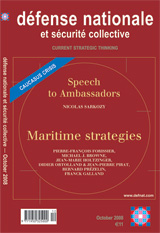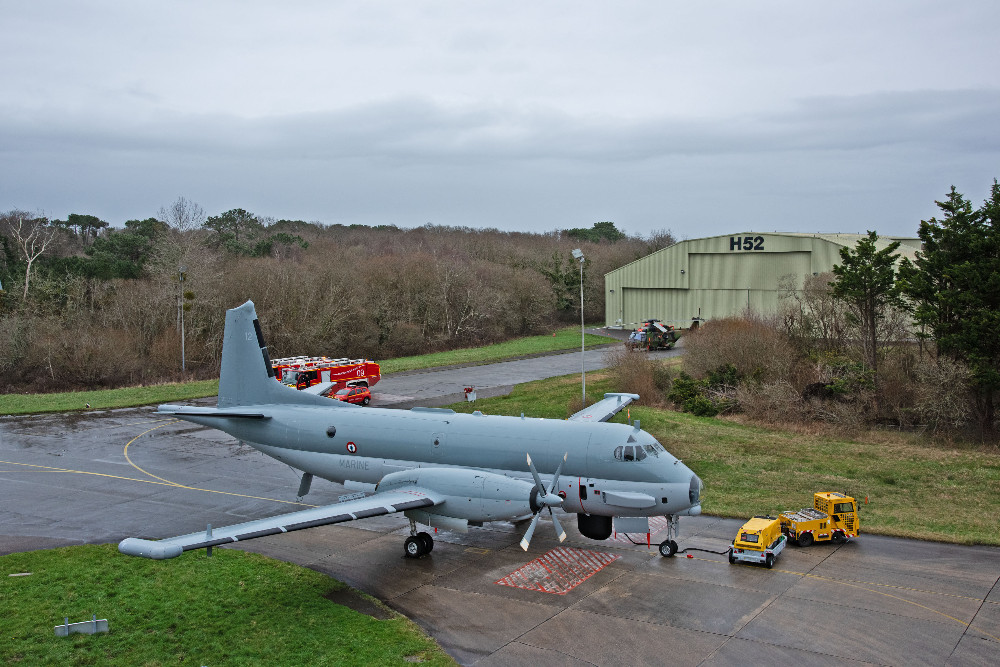Edition anglaise

October 2008 - n° 712
Speech to Ambassadors - Nicolas Sarkozy
Speech by Mr Nicolas Sarkozy President of the French Republic, at the sixteenth Ambassadors’ Conference, Paris, 27 August 2008 (www.elysee.fr).
Events in Georgia: strategic surprise or strategic challenge? - Jacques Rosiers
After a preliminary analysis of events in Georgia in early August 2008, what message are we getting? According to whether you are Georgian or Russian it will obviously not be the same message. But how are we to react, in this early part of the twenty-first century, as a player on the international scene, in the face of violence and military force on Europe’s boundaries? Rather than simply reacting to events and trotting out the old Cold War clichés, how can we better apprehend our future and the role of strategy in it?
Russia-Georgia: the multipolar world's first war - Pierre-Emmanuel Thomann
An analysis of the Russia-Georgia conflict from a geopolitical point of view brings out the strategic gains pocketed by Russia. They have put a brake on NATO’s enlargement, which is responsible for Russia’s perception of encirclement. On a wider scale, the conflict represents the arrival of a multipolar world. The European Union is directly concerned by this clash between Russia and the United States over the forming of spheres of influence on the Eurasian landmass. From the perspective of a ‘political Europe’, the security interests of the Union are dictated by geography. Renunciation of the enlargement of the EU and the Atlantic Alliance would be a response to the imperatives governing the stability of the continent and would open the way to a new Eurasian security system.
The Georgia-Russia conflict: Internet, the other battlefield - Laurence Ifrah
During the armed conflict between Georgia, South Ossetia and Russia, attacks were made principally against Georgian websites, but there were also attacks against Russian and Ossetian servers. Monitored closely as they were by system security experts, these attacks on occasion gave rise to some imaginative interpretations, as it is technically impossible to prove exactly who was to blame. Some observers expanded on unsubstantiated rumours circulating on the Internet with hasty comment on the situation but without bothering to check their sources. The wide spectrum of the information published about this conflict demonstrates how easy it is to be manipulated by people whose political interest is to exploit disinformation and propaganda.
Post-Soviet Azerbaijan, between the United States and Russia - Julien Zarifian
Thanks to its energy resources, Azerbaijan has achieved importance as a Eurasian actor. It has also managed, following independence from the USSR in 1991, to balance its foreign relations with Russia and the West. Whereas initially a rejection of Russia and rapprochement with the West predominated, for a number of years there has been a realignment. The only serious cloud on the horizon in Azeri foreign relations is its conflict with neighbouring Armenia over Nagorno-Karabakh.
The Afghan crisis and Pakistan - Kacem Fazelly
This article deals with the evolution of the simplistic view the United States took of Pakistan’s place in the Afghan crisis. Initially seen as a necessary intervening power, Pakistan is now increasingly considered a source of tension itself and a threat to peace, with its own contradictions, including ethno-religious groupings hostile to the appeal of democratic legitimacy.
The war against terrorism: ‘take away the fire under the cauldron’ - Daniel Hervouët
The notion of a ‘war’ against terrorism is now devoid of meaning. Realising this, General David Petraeus, now at the head of US Central Command, faced with the realities on the ground in Iraq, rediscovered the lessons drawn by David Galula in his ‘Counter-Insurgency Warfare’ published in the 1960s. This meeting across time of two likeminded men of operational experience and impressive intellect reminds us that, beyond superficial change, there are enduring lessons from the past that it would be irresponsible to neglect.
The Afghan war and terrorism: the RAND ‘Balck Paper’ - Jean-Philippe Immarigeon
At the very moment when the White Paper conclusions are upsetting our strategic approach, the RAND Corporation has discovered that the concept of a war against terrorism is just an illusion, that al-Qaeda presents a risk that is close to zero, and that America has been mistaken since 2001 in committing itself militarily in Afghanistan.
The White Paper takes to the water - Pierre-François Forissier
Facing the uncertainties resulting from global strategic changes, the White Paper on defence and national security demands a proactive and responsive approach. ‘France’s ambition is not to suffer the effects of uncertainty but to react, to think ahead.’ It is driven by a need to modernise maritime assets, at the same time continuing to undertake multiple roles in response to the new challenges presented by globalisation. Refocusing the Navy on its combat missions, the White Paper reasserts the importance given to its maritime security operations.
Enabling concepts for maritime security in the twenty-first century - Michael J. Browne
Since the concept of a ‘1000 Ship Navy’ was first proposed at the International Seapower Symposium in Newport, RI in November 2005, leaders of the world’s navies have met in various forums to think about how to promote a Global Partnership that provides for our common safety and security on the high seas. Rear Admiral Michael J. Browne reviews the concept of Global Maritime Partnerships and suggests that certain practices—in particular, how we build our ships and ship systems—will enable our collective ability to achieve the vision of global maritime security.
Current and future stakes in the South China Sea - Jean-Marie Holtzinger
Oil and gas resources rank high among the many riches of the South China Sea. Naturally enough, these attract the interest, or more, of the countries bordering it—of China in particular, which aims to dominate the zone as a leading regional power. Behind the many Chinese territorial claims in the South China Sea lies Beijing’s desire to control Asia’s principal energy and commercial supply route, which passes through strategically important narrows, and to take as its own the submarine wealth that is also sought after by the other littoral countries.
The South China Sea - Didier Ortolland, Jean-Pierre Pirat
Notes on the South China Sea taken from Atlas géopolitique des espaces maritimes (Éditions Technip).
Chinese, Japanese and other Far-Eastern navies - Bernard Prézelin
Updates on the Chinese, Japanese and Far-Eastern navies taken from the preface to Flottes de Combat 2008 (Éditions Maritimes & d’Outre-Mer).
Singapore and water - Franck Galland
Singapore has turned a disadvantage—its shortage of water and its dependence on supplies from neighbouring Malaysia—into a strength. Its use of the most recent technologies (recycling used water, desalination), its development of centres of excellence in research and its success in attracting leading global water companies have made it a major emerging power in the field of water technologies.
The nameless enemy - Jean-Pierre Steinhofer
In the author’s view, the concept of a ‘global war on terrorism’ is a semantic, strategic, military and legal aberration, which, by confusing the enemy and the method of fighting him, has led the Western powers into an intellectual impasse that muddles their thinking in many areas and results in ludicrous situations.
Towards a new social role for the military - Olivier Pons
The French Army played a decisive role vis-à-vis the country’s youth at the end of the nineteenth century. Following the defeat of 1870, the thinking, composition and influence of the military evolved both in France and its colonies. Universal military service, introduced in 1872, played a central part in that change, giving the Army a decisive social role. Today, ten years after the ending of conscription, the armed forces play a less prominent social role, whereas the youth of today, particularly the less privileged, are facing increasing difficulties. So is there a new need for social regeneration, and can the armed forces play a role in this?
The South Ossetia conflict - Viatcheslav Avioutskii
Russia’s intervention in Georgia is merely the continuation by other means of its rivalry with the United States over the former Soviet republics. Russia put the Georgian Army to rout, justifying its action by its determination to defend the South Ossetians in the immediate vicinity of its borders. Moscow’s recognition of South Ossetia and Abkhazia has led to a new spiral of tension with the West.






_astronaut_Sophie_Adenot_(jsc2025e058846_alt).jpg)

